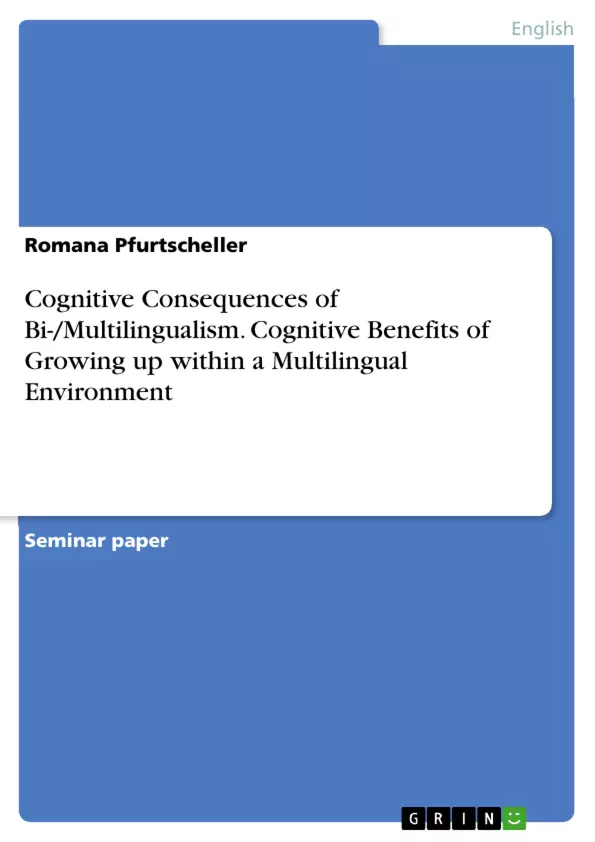This paper examines the cognitive benefits deriving from growing up in a multilingual environment. It deals with the questions if bi-/multilinguals can learn a new language faster than others and if they have better task-switching capacities than monolinguals. Eventually, the benefits of bi-/multilingualism for elderly people are described.
In order to give an answer to these questions, first, this paper has a look on the cognitive consequences of bi-/multilingualism, including the executive function, the second and third language acquisition connected with the parallel activation of both languages, the benefits in older age and the effects on memory. Following, the development of multilingual individuals will be described. The paper will look on the personal development, the academic potential and the analytical thinking of multilingual individuals.
In current times, more than half of the worlds' population is bilingual or multilingual. A survey which was conducted by the European Commission in 2006, shows that 56 percent of the participants are able to speak in one or more language(s) other than their mother tongue. This percentage is even higher in some of the world’s areas: for instance, 99 percent of Luxembourgers and 97 percent of Slovaks master more than one language.
This upbringing in a multilingual environment does not only facilitate cross-cultural communication but has positive effects on the cognitive abilities. Research has shown that bi-/multilinguals have outperformed monolinguals in several tasks, such as the Flanker task, the Stroop task, or the Trail Making task, showing that bi-/multilinguals can have better attention and task-switching capacities than monolinguals.
However, the most interesting and consistent results have shown that bi-/multilingualism has positive effects at both ends of the age spectrum: Children who grew up in a bi-/multilingual environment can better adjust to environmental changes than others and elderly people suffer from less cognitive decline.
Table of Contents
- Introduction
- Cognitive Consequences of Bi-/Multilingualism
- Executive functions
- Second and third language acquisition and parallel activation
- Benefits in older age
- Effects on memory
- Development of multilingual individuals
- Personal development
- Academic potential
- Analytical thinking
- Conclusion
Objectives and Key Themes
This paper examines the cognitive benefits of growing up in a multilingual environment. It investigates if bilinguals can learn a new language faster than others and if they have better task-switching capacities than monolinguals. It also explores the benefits of bilingualism for elderly people. The paper explores the cognitive consequences of bi-/multilingualism, including executive function, second and third language acquisition, parallel activation of languages, benefits in older age, and effects on memory. It also describes the development of multilingual individuals in terms of personal development, academic potential, and analytical thinking.
- Cognitive advantages of bilingualism
- Executive function and cognitive control in bilinguals
- Benefits of bilingualism for language acquisition and memory
- Impact of bilingualism on personal development and academic potential
- Cognitive advantages of bilingualism in older age
Chapter Summaries
- Introduction: This chapter introduces the concept of bilingualism and multilingualism, presenting statistics on the prevalence of language diversity worldwide. It highlights the potential cognitive benefits of growing up in a multilingual environment.
- Cognitive Consequences of Bi-/Multilingualism: This chapter delves into the effects of bilingualism on cognitive functions, including executive function, language acquisition, and memory. It discusses studies that have shown enhanced cognitive performance in bilinguals compared to monolinguals, particularly in tasks involving attention, inhibition, and task-switching. The chapter also explores the potential benefits of bilingualism for aging, particularly in terms of cognitive reserve and memory generalization.
- Development of Multilingual Individuals: This chapter focuses on the personal, academic, and cognitive development of multilingual individuals. It explores how exposure to multiple languages can influence factors such as personal development, academic potential, and analytical thinking skills.
Keywords
The main keywords and focus topics of this text are: bilingualism, multilingualism, cognitive benefits, executive function, language acquisition, memory, personal development, academic potential, analytical thinking, cognitive reserve, and cognitive decline.
Frequently Asked Questions
What are the cognitive benefits of growing up bilingual?
Bilinguals often show enhanced executive functions, better task-switching capacities, and improved attention compared to monolinguals.
Can bilinguals learn a third language faster?
Research suggests that prior experience with multiple languages can facilitate the acquisition of additional languages.
How does multilingualism affect the elderly?
It can contribute to a "cognitive reserve," potentially delaying the onset of cognitive decline and symptoms of dementia.
What is the "Flanker task" or "Stroop task"?
These are psychological tests used to measure cognitive control and the ability to inhibit irrelevant information, where bilinguals often outperform monolinguals.
Does bilingualism impact academic potential?
Yes, the analytical thinking and cognitive flexibility associated with multilingualism can have positive effects on academic performance.
- Citar trabajo
- Romana Pfurtscheller (Autor), 2020, Cognitive Consequences of Bi-/Multilingualism. Cognitive Benefits of Growing up within a Multilingual Environment, Múnich, GRIN Verlag, https://www.grin.com/document/954739



